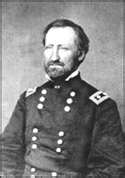Isaac Peace Rodman -Union Army
(1822-1862)
Most of the life of Isaac Peace Rodman was a reflection of his middle name. Born in South Kingstown in 1822, he was still there when the war started.
At the New Bern battle, on March 14, 1862, Rodman offered to assault the center of the enemy line, perceiving an opening where the railroad crossed the Confederate entrenchments. He had barely received permission when he led the 4th Rhode Island on an impetuous charge, breaking the Rebel line and capturing nine pieces of artillery. “Rodman’s soldierly movement was the culminating point of the day,” an officer later wrote, and the historian of the 9th Corps commented, “Colonel Rodman, with a fine soldierly instinct, perceived that the enemy’s line could be there successfully pierced, and his prompt and daring spirit suggested that, without losing time in waiting for orders, he should take advantage of the opportunity so fortunately offered.” Later in the North Carolina coastal campaign, Rodman was stricken with typhoid fever and returned to his South Kingstown home to recuperate.
When he rejoined the army, Rodman took over the 3rd Division of Burnside 9th Corps. His new command was minimally involved in the Battle of South Mountain on September 14, 1862. Three days later brought America’s bloodiest day, a massive, hideous battle in the Maryland countryside near and along the banks of Antietam Creek.
Rodman was bringing up his old regiment, the 4th Rhode Island, when he was struck by a minie bullet in the chest. It penetrated his left lung and knocked him from his horse.
He was taken to a field hospital set up at the Rohrback house. When he was stripped, a bloodstained Bible was found inside his shirt. He remained lucid, and although he knew his wound was mortal and he suffered great pain from internal bleeding, he never complained and was calm, composed, and submissive. When the news reached South Kingstown, his wife, father, and family journeyed to Maryland. They were at his side when Isaac Rodman died, thirteen days after his wounding, on September 30, 1862. The Rodmans brought his remains home, and laid them to rest in the family cemetery in Peace Dale.
Back to Hero index
At the New Bern battle, on March 14, 1862, Rodman offered to assault the center of the enemy line, perceiving an opening where the railroad crossed the Confederate entrenchments. He had barely received permission when he led the 4th Rhode Island on an impetuous charge, breaking the Rebel line and capturing nine pieces of artillery. “Rodman’s soldierly movement was the culminating point of the day,” an officer later wrote, and the historian of the 9th Corps commented, “Colonel Rodman, with a fine soldierly instinct, perceived that the enemy’s line could be there successfully pierced, and his prompt and daring spirit suggested that, without losing time in waiting for orders, he should take advantage of the opportunity so fortunately offered.” Later in the North Carolina coastal campaign, Rodman was stricken with typhoid fever and returned to his South Kingstown home to recuperate.
When he rejoined the army, Rodman took over the 3rd Division of Burnside 9th Corps. His new command was minimally involved in the Battle of South Mountain on September 14, 1862. Three days later brought America’s bloodiest day, a massive, hideous battle in the Maryland countryside near and along the banks of Antietam Creek.
Rodman was bringing up his old regiment, the 4th Rhode Island, when he was struck by a minie bullet in the chest. It penetrated his left lung and knocked him from his horse.
He was taken to a field hospital set up at the Rohrback house. When he was stripped, a bloodstained Bible was found inside his shirt. He remained lucid, and although he knew his wound was mortal and he suffered great pain from internal bleeding, he never complained and was calm, composed, and submissive. When the news reached South Kingstown, his wife, father, and family journeyed to Maryland. They were at his side when Isaac Rodman died, thirteen days after his wounding, on September 30, 1862. The Rodmans brought his remains home, and laid them to rest in the family cemetery in Peace Dale.
Back to Hero index

